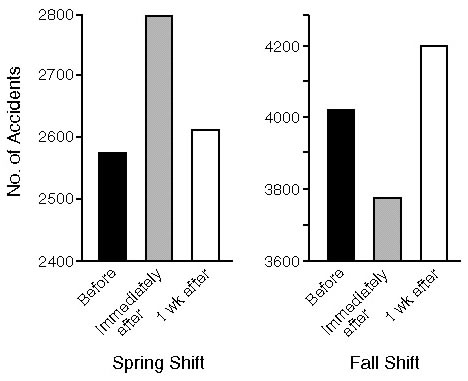
Daylight saving time kicked into action yesterday morning at 2:00 a.m., but more people will feel its effects this morning now that it’s Monday. It takes some time for people’s sleep schedules to move, and chances are that a good number of you lost about an hour’s sleep last night. According to this now often-cited New England Journal of Medicine article, that lost hour of sleep correlates with an increase in car accidents; conversely, the gained hour of sleep in the fall correlates with a drop in car accidents:
From Daylight Savings Time and Traffic Accidents, which appeared in the April 4, 1996 issue of the New England Journal of Medicine.
A “heat map” showing where the economic losses due to the shift to daylight saving time are.
There’s also an economic cost to the shift to daylight saving time, if the Lost Hour Economic Index is to be believed. In a study conducted by Chmura Economics and Analytics, the time shift can cost the U.S. as much as $434 million. This lost money comes from:
- The increase in the number of heart attacks (catalogued in the New England Journal of Medicine),
- increased workplace injuries in the mining and construction industries (catalogued in the Journal of Applied Psychology), and
- increased cyberloafing (published in the Journal of Applied Psychology).
The study doesn’t even factor in the economic losses from car accidents.

What the shift to daylight saving time feels like.
What can I say in closing, other than: be careful out there!

